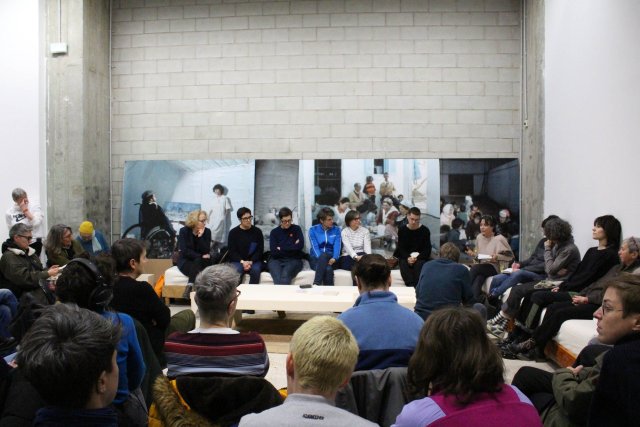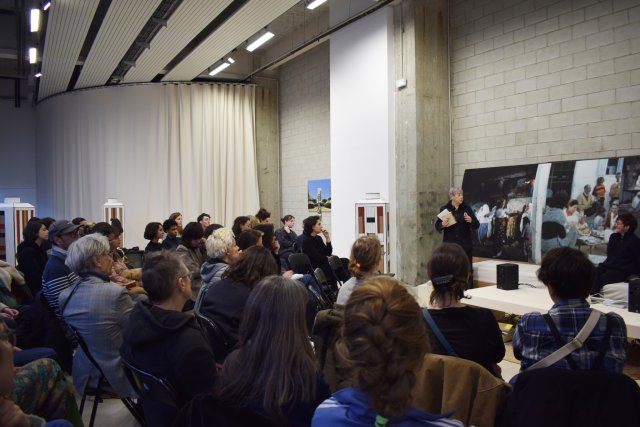Events
Previous events
Friday January 27, from 6 to 8:30pm
Collective reading of Le Corps lesbien, presented by Catherine Ecarnot, and preceded by " J/E ", a radiophony by Syn Guérin and Eugénie Kuffler

Bétonsalon, 2023.
Friday, February 24, 6 to 8:30 pm
Collective reading of La pensée straight

Bétonsalon, 2023.
Friday, March 31, from 6 to 8:30 pm
Collective reading of Wittig’s L’Opoponax
Friday, April 21, from 6 to 8:30 pm
Collective reading: Wittig’s theatre, around Le Voyage sans fin, with an intervention by Lorraine Wiss, Doctor of Theatre Studies, and broadcasting of extracts from the radio plays La récréation and Le Grand Cric Jules.
Friday May 26 , from 6pm 8:30pm
Collective reading (in French) of Virgil, non (1985), with Aurélie Massa (artist, author and performer) and Theo Mantion (PhD candidate in literature at Harvard University), as well as a discovery of sound archives.
Friday June 23, from 6pm to 8:30pm
Program around lesbian and queer writing, with Monique Wittig and beyond
Saturday, July 8, from 5pm to 7pm
Introduction to karate
By Marie Bouard, instructor at Niji-Kan Karaté Do, an LGBT karate club
Open to beginners, free, by registration only at info@betonsalon.net
As an extension of Monique Wittig’s collective readings at Bétonsalon since the beginning of the year 2023, this introduction to karate is an opportunity to get in shape and put into practice the deconstruction of gender relations. In the long history of the links between feminist movements and self-defence, it is also a nod to the practice of this martial art by many feminists of the 1970s, including Monique Wittig, who began practising it in 1975 and through it met Sande Zeig, her teacher and later her partner, with whom she wrote Brouillon pour un dictionnaire des amantes the following year.
Saturday, September 9, from 4pm to 6pm
Introduction to karate workshop
By Marie Bouard, instructor at Niji-Kan Karaté Do, an LGBT karate club
Open to beginners, free, by registration only at info@betonsalon.net
Saturday, September 30, from 6pm to 8:30pm
Collective reading of Les Guérillères, accompanied by audio excerpts presented by Clemence Allezard and more
Saturday, October 28, from 6pm to 8:30pm
Collective reading of Paris-la-politique et autres histoires
Friday, 8 December
from 6pm to 8pm
Workshop with Modèle vivant·e, transfeminist collective for drawing and dissident representations
Open to all
from 8pm to 10pm
Popcorn screening of The Girl (2000), directed by Sande Zeig with a screenplay by Monique Wittig
Set in Paris. A young woman, The Painter, falls for The Girl, a singer she meets in a Parisian nightclub. Even though The Girl makes it clear that their affair will only last one night, the two women keep seeing each other. However, a threat looms...
Released in 2000, in the last years of screenwriter Monique Wittig’s life, The Girl is a surprising cinematographic object, and a new instance of joint work between the writer and her partner, director Sande Zeig.

Claire Keim and Agathe de La Boulaye in The Girl, 2000. Courtesy Sande Zeig.
Saturday, 9 December
from 2pm to 6pm
Workshop "toutes pratiques agréables en bouche"
with Léna Salabert-Triby & Félixe Kazi-Tani from the collective Bye Bye Binary
Please register at info@betonsalon.net
In 1976, Monique Wittig and Sande Zeig released their Brouillon pour un dictionnaire des amantes (Draft for a female lovers dictionary). Basing themselves on a new relationship to language, the use of unexpected feminised phrases ("cadavres exquises", "animales", etc), shifts of meaning and even linguistic inventions, they unfolded a mythical world of Amazons, a whole lesbian civilisation with its own rites, memories and gestures.
Bye Bye Binary, a collective for research and typographic creation founded in 2018, is also committed to opening up other narratives in the written language: updating and inventing slogans, grammar-hacking, post-genre ligatures, etc. The collective has been invited to celebrate Wittig this year by creating a series of flags that will be displayed in the Bétonsalon space at the end of the Cap pour l’île des vivantxs program.
By way of activation, an afternoon of reflection and creation around the graphic and iconographic forms we can give to language, and even more so to our feminist, queer, rude and unpolished languages.

from 7pm to 9pm
Evening of readings
With the texts and voices of Loan Coppet, Stéphanie Garzanti, Béatrice Lussol, Suzette Robichon, and those who wish to join ! More info at info@betonsalon.net
Share